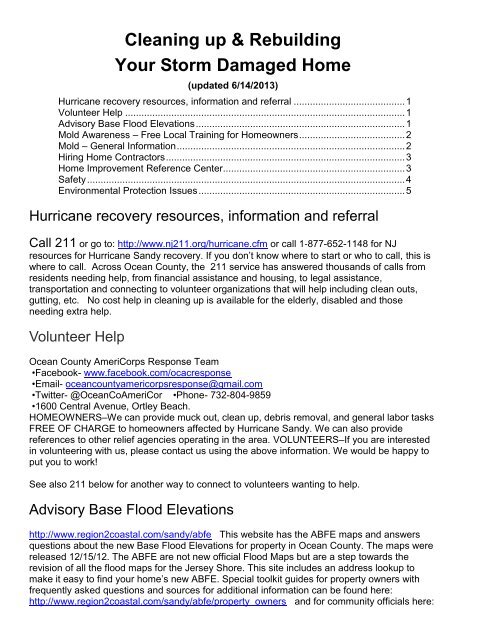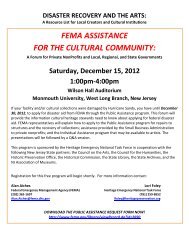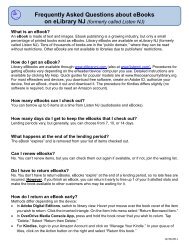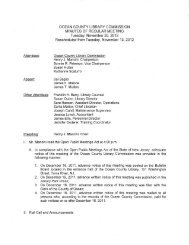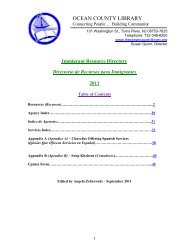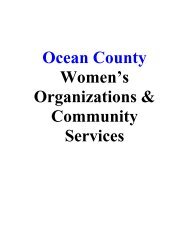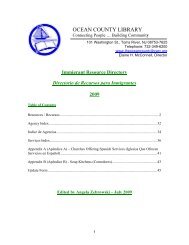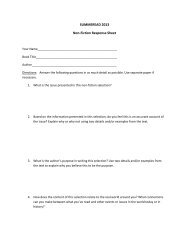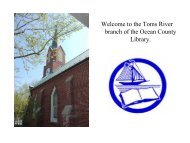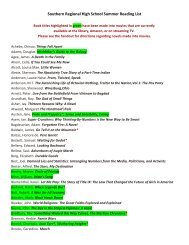Cleaning And Repairing Your Storm Damaged Home
Cleaning And Repairing Your Storm Damaged Home
Cleaning And Repairing Your Storm Damaged Home
Create successful ePaper yourself
Turn your PDF publications into a flip-book with our unique Google optimized e-Paper software.
<strong>Cleaning</strong> up & Rebuilding<br />
<strong>Your</strong> <strong>Storm</strong> <strong>Damaged</strong> <strong>Home</strong><br />
(updated 6/14/2013)<br />
Hurricane recovery resources, information and referral ......................................... 1<br />
Volunteer Help ....................................................................................................... 1<br />
Advisory Base Flood Elevations ............................................................................. 1<br />
Mold Awareness – Free Local Training for <strong>Home</strong>owners ....................................... 2<br />
Mold – General Information .................................................................................... 2<br />
Hiring <strong>Home</strong> Contractors ........................................................................................ 3<br />
<strong>Home</strong> Improvement Reference Center ................................................................... 3<br />
Safety ..................................................................................................................... 4<br />
Environmental Protection Issues ............................................................................ 5<br />
Hurricane recovery resources, information and referral<br />
Call 211 or go to: http://www.nj211.org/hurricane.cfm or call 1‐877-652-1148 for NJ<br />
resources for Hurricane Sandy recovery. If you don’t know where to start or who to call, this is<br />
where to call. Across Ocean County, the 211 service has answered thousands of calls from<br />
residents needing help, from financial assistance and housing, to legal assistance,<br />
transportation and connecting to volunteer organizations that will help including clean outs,<br />
gutting, etc. No cost help in cleaning up is available for the elderly, disabled and those<br />
needing extra help.<br />
Volunteer Help<br />
Ocean County AmeriCorps Response Team<br />
•Facebook- www.facebook.com/ocacresponse<br />
•Email- oceancountyamericorpsresponse@gmail.com<br />
•Twitter- @OceanCoAmeriCor •Phone- 732-804-9859<br />
•1600 Central Avenue, Ortley Beach.<br />
HOMEOWNERS–We can provide muck out, clean up, debris removal, and general labor tasks<br />
FREE OF CHARGE to homeowners affected by Hurricane Sandy. We can also provide<br />
references to other relief agencies operating in the area. VOLUNTEERS–If you are interested<br />
in volunteering with us, please contact us using the above information. We would be happy to<br />
put you to work!<br />
See also 211 below for another way to connect to volunteers wanting to help.<br />
Advisory Base Flood Elevations<br />
http://www.region2coastal.com/sandy/abfe This website has the ABFE maps and answers<br />
questions about the new Base Flood Elevations for property in Ocean County. The maps were<br />
released 12/15/12. The ABFE are not new official Flood Maps but are a step towards the<br />
revision of all the flood maps for the Jersey Shore. This site includes an address lookup to<br />
make it easy to find your home’s new ABFE. Special toolkit guides for property owners with<br />
frequently asked questions and sources for additional information can be found here:<br />
http://www.region2coastal.com/sandy/abfe/property_owners and for community officials here:
http://www.region2coastal.com/sandy/abfe/community_officials The State of NJ has put<br />
together instructions on using this website and finding your address’s ABFE<br />
http://www.nj.gov/dca/divisions/codes/alerts/pdfs/finding_coastal%20_A_zone_%20on_the_%2<br />
0FEMA_%20maps.pdf<br />
FEMA has announced they expect to release a new version of the flood maps county-bycounty<br />
soon, perhaps as early as June or July 2013. <strong>Home</strong>owners with substantial damage<br />
have four years to become compliant with the new standards and elevations; insurance rates<br />
won’t be calculated off the new maps until they’ve been finalized after a period of public review<br />
and commenting.<br />
Mold Awareness – Free Local Training for <strong>Home</strong>owners<br />
OCEAN COUNTY HEALTH DEPARTMENT AND UMDNJ OFFERING MOLD AWARENESS<br />
PROGRAMS FOR HOMEOWNERS<br />
The Ocean County Health Department (OCHD), working with the University of<br />
Medicine and Dentistry of New Jersey (UMDNJ) will be hosting 2 seminars on mold awareness<br />
for homeowners and residents.<br />
June 15, 2013<br />
9:30 AM to 12:30 PM<br />
Preferred Behavioral Health of NJ<br />
725 Airport Rd. Suite B<br />
Lakewood, NJ<br />
June 18, 2013<br />
6:30 PM to 9:30 PM<br />
Congregation B'nai Israel<br />
1488 Old Freehold Rd<br />
Toms River, NJ 08753<br />
Residents can register for the program at http://ophp.umdnj.edu/moldtraining<br />
or call Leslie Terjesen at 732-341-9700, ext. 7224. You can also visit the Ocean County Health<br />
Department’s website at www.ochd.org for other safety information related to the storm.<br />
Mold – General Information<br />
FEMA<br />
Get Rid of Mold Release date: NOVEMBER 18, 2012<br />
LINCROFT, N.J.-- Everywhere they look, survivors of Hurricane Sandy see reminders of the<br />
destruction – fallen trees, washed out roads, smashed windows. But the most persistent<br />
reminder may be the least visible: mold. The microscopic fungus grows wherever moisture is<br />
present – in debris, inside walls, under floors, in attics. If not treated, mold can cause disease,<br />
trigger allergic reactions and damage materials long after the storm.<br />
The good news: mold, and its close relative mildew, can be controlled. Once a home is<br />
habitable, dry it out with fans, dehumidifiers and vacuums. Remove all wet items including
carpeting, furniture, insulation, food products and bedding. Any material that has been wet<br />
more than 48 hours should be thrown out!<br />
Unsaturated porous material, such as drywall, ceiling tiles, furniture that contains wood byproducts<br />
and carpeting, and non-porous items – metal, glass, wood, plastic – can be treated in<br />
a few simple steps:<br />
Wear gloves, a mask and eye protection. Make sure the area is well ventilated.<br />
Wash items with non-ammonia based detergent and hot water and allow to dry.<br />
Disinfect cleaned surfaces with a solution of a cup and a half of bleach in a gallon of hot<br />
water. Let the solution stay on the surface at least 10 minutes.<br />
Rinse with clear water and allow to dry.<br />
Monitor treated materials for several days. If mold develops, discard them.<br />
Severe mold infestations should be treated by qualified professionals. Survivors who<br />
have flood insurance should carefully document the damage with photos, receipts and<br />
samples from water-damaged goods.<br />
The primary concern is health. Survivors should take precautions, because mold affects the<br />
nervous system, causes headaches, mood changes, memory loss, respiratory problems, nasal<br />
and sinus congestion and skin, eye, nose and throat irritation.<br />
For more information about mold, its removal, its prevention and associated health problems,<br />
go to the New Jersey Department of Health Mold website.<br />
http://www.state.nj.us/health/iep/mold_links.shtml<br />
Also go to the FEMA publication Mold & Mildew: <strong>Cleaning</strong> Up <strong>Your</strong> Flood-<strong>Damaged</strong> <strong>Home</strong><br />
http://www.fema.gov/library/viewRecord.do?id=3049 and FEMA video, Eradicating Mold and<br />
Mildew. http://www.fema.gov/medialibrary/media_records/726 and the steps outlined in<br />
FEMA’s Mold and Mildew in your Flood <strong>Damaged</strong> <strong>Home</strong>.<br />
http://www.fema.gov/pdf/rebuild/recover/fema_mold_brochure_english.pdf<br />
Flood Cleanup information from the Federal EPA (including material in Spanish)<br />
http://www.epa.gov/iaq/flood/index.html<br />
Hiring <strong>Home</strong> Contractors<br />
Hiring <strong>Home</strong> Improvement Contractors, a guide from the State of New Jersey – includes tips<br />
on hiring, licensing board information and how to complain.<br />
http://www.njconsumeraffairs.gov/brief/improve.pdf<br />
Beware of Fraudulent <strong>Home</strong> Repair Contractors tips from the State of New Jersey on what to<br />
look for before hiring a contractor. http://www.nj.gov/lps/ca/erdos/contractors.htm<br />
<strong>Home</strong> Improvement Reference Center<br />
Free detailed, user-friendly “how-to” information about home improvements and repairs. HIRC<br />
includes magazine articles and reference content as well as videos and images designed to<br />
help homeowners tackle home repairs safely. Find step-by-step information along with<br />
background information and basic tips on topics including electrical, plumbing, woodworking,<br />
outdoor projects, maintenance and decorating. Provided by the New Jersey State Library. Go
to Ocean County Library’s list of databases<br />
http://theoceancountylibrary.org/researchinfo/resources_all.htm and look for <strong>Home</strong><br />
Improvement Reference Center. To use this at home, you will need your library barcode<br />
number.<br />
Safety<br />
The NJ Department of Health has environmental and occupation health professionals available<br />
to answer questions related to the clean-up effort. An environmental health and safety<br />
specialist can be reached by calling the emergency hotline at 1-866-234-0964 or by calling<br />
2-1-1. http://www.state.nj.us/health/news/2012/approved/20121126b.html<br />
Don’t get hurt during cleanup<br />
Important advice from the Center for Disease Control on safety:<br />
http://emergency.cdc.gov/disasters/cleanup/<br />
Carbon Monoxide Exposure http://emergency.cdc.gov/disasters/carbonmonoxide.asp<br />
Chain Saw Injury http://emergency.cdc.gov/disasters/chainsaws.asp<br />
Chemical Hazards http://emergency.cdc.gov/disasters/chemicals.asp<br />
<strong>Cleaning</strong> & Sanitizing with Bleach http://emergency.cdc.gov/disasters/bleach.asp<br />
Debris Smoke http://www.cdc.gov/nceh/airpollution/airquality/debris_smoke.htm<br />
Electrical Hazards http://emergency.cdc.gov/disasters/electrical.asp<br />
Environmental Concerns http://emergency.cdc.gov/disasters/environmental.asp<br />
Flood Recovery http://emergency.cdc.gov/disasters/floods/<br />
Food & Water Safety http://emergency.cdc.gov/disasters/foodwater/facts.asp<br />
Hand Hygiene http://emergency.cdc.gov/disasters/floods/sanitation.asp<br />
Heat Exposure http://emergency.cdc.gov/disasters/extremeheat/<br />
HVAC Systems http://www.cdc.gov/niosh/topics/emres/<strong>Cleaning</strong>-Flood-HVAC.html<br />
Mold http://emergency.cdc.gov/disasters/mold/<br />
Pressure Washer Injury http://emergency.cdc.gov/disasters/pressurewasherinjury.asp<br />
Pressure Washers Safety http://emergency.cdc.gov/disasters/pressurewashersafety.asp<br />
Reentering <strong>Your</strong> Flooded <strong>Home</strong> http://emergency.cdc.gov/disasters/mold/reenter.asp<br />
Respiratory Protection for Residents http://emergency.cdc.gov/disasters/disease/respiratory.asp<br />
The Department of Labor and OSHA also recommend on cleaning up safely:<br />
OSHA - Keeping Workers Safe During Hurricane Sandy Cleanup and Recovery:<br />
http://www.osha.gov/sandy .<br />
OSHA – Flood Response and Recovery:<br />
http://www.osha.gov/dts/weather/flood/response.html
EPA - Hurricane Sandy Response and Recovery: http://www.epa.gov/sandy .<br />
FEMA – Ready.gov: http://www.ready.gov/hurricanes .<br />
National Institute for Environmental Health Sciences –<br />
http://tools.niehs.nih.gov/wetp/index.cfm?id=2472 .<br />
National Institute for Occupational Safety and Health –<br />
http://www.cdc.gov/niosh/topics/emres/flood.html .<br />
U.S. Department of Labor - Hurricane Recovery Assistance:<br />
http://www.dol.gov/opa/hurricane-recovery.htm<br />
Environmental Protection Issues<br />
State of NJ website for information on debris management, water quality, Reconstruction<br />
Guidance: Land Use Regulation (CAFRA, Infrastructure, Houses, Docks, Bulkheads, Marinas,<br />
etc.) and more. http://www.nj.gov/dep/special/hurricane-sandy/ More information on these<br />
topics at http://www.nj.gov/dep/landuse/sandy.html<br />
AZ/CG/MD/RJ/EJC 6/14/13


